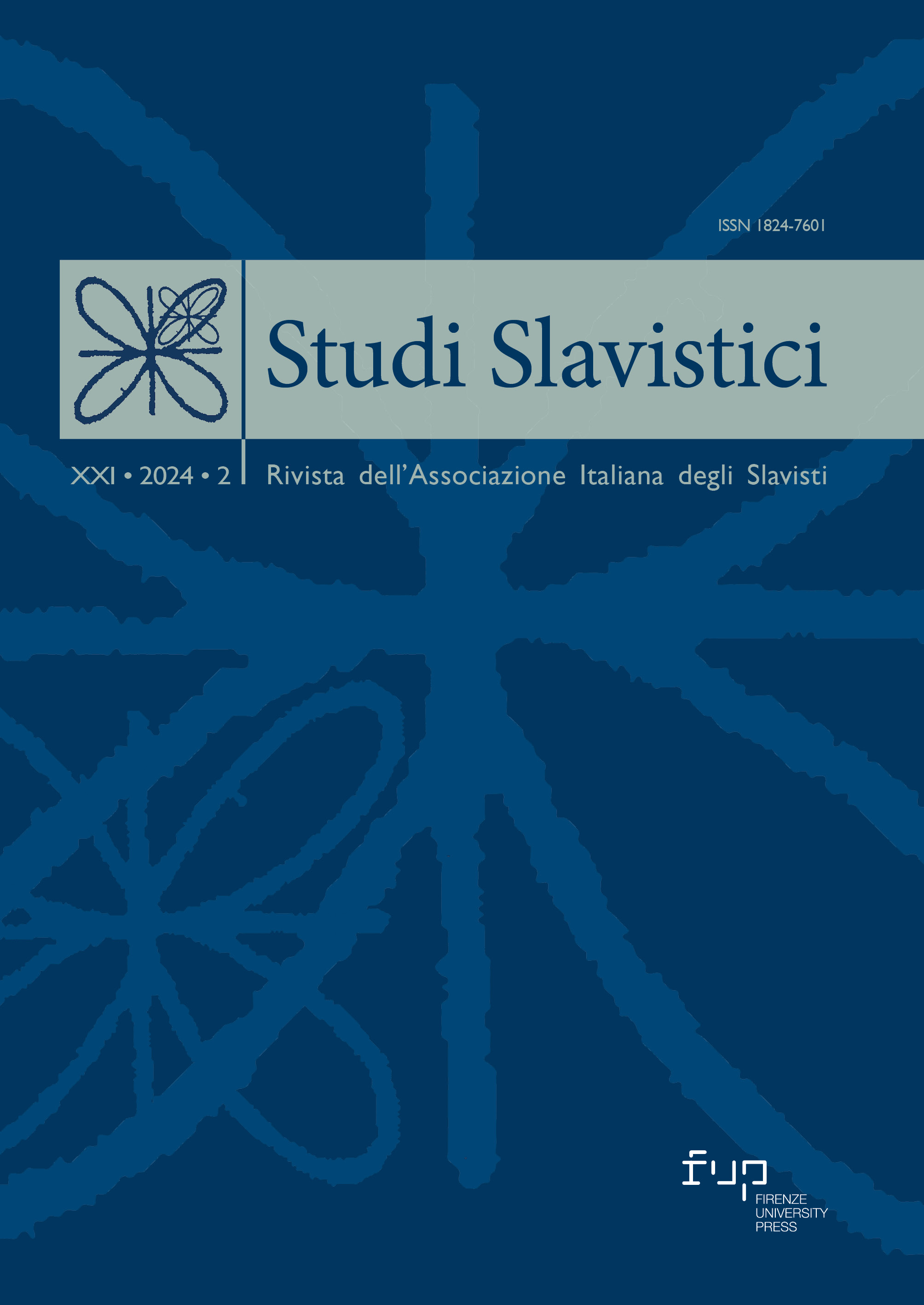Articoli
Published 2025-02-07
Copyright (c) 2024 Olga E. Pekelis

This work is licensed under a Creative Commons Attribution 4.0 International License.
Abstract
This paper investigates the synchronic traits and the microdiachronic evolution of the Russian pronoun nekotoryj. Synchronically, I argue that nekotoryj has four different meanings, with the meaning of an indefinite pronoun being the most frequent and the least distributionally restricted. Diachronically, nekotoryj is shown to have had an article-like function in the Russian language of the 19th century and earlier, which it shared with the numeral odin ‘one,’ while in modern Russian this function is undertaken by odin alone. Within a typological stance on the facts observed, I suggest that nekotoryj displays both expected and unexpected traits. The former includes the outcome of its competition with odin. The latter concerns the distribution of nekotoryj across the contexts that make up the semantic map of indefinite pronouns. Nekotoryj appears to be an instance of an indefinite pronoun that contradicts some predictions put forward by the semantic map.References
- Аникин 2022: А.Е. Аникин, Русский этимологический словарь, XVI (ерепениться – житьё). Москва 2022.
- Богуславский 1996: И.М. Богуславский, Сфера действия лексических единиц, Москва 1996.
- Евгеньева 1986: А.П. Евгеньева (ред.), Словарь русского языка, II (К-О), Москва 19863.
- Крысько и др. 2020: В.Б. Крысько, А.М. Кузнецов, Я.А. Пенькова, Местоимения, в: В.Б.Крысько (ред.), Историческая грамматика русского языка. Энциклопедический словарь, Москва 2020, с. 172-189.
- Мишина 1960: К.И. Мишина, Значение и употребление слова “один” в русском языке, “Учен. зап. МГПИ им. В. И. Ленина”, 1960, 148, с. 94-112.
- Николаева 2013: Т.М. Николаева, Словосочетания с лексемой один: форма, значения и их контекстная маркированность, в: Она же, Лингвистика: избранное, Москва 2013, с. 246-265.
- Падучева 1985: Е.В. Падучева, Высказывание и его соотнесенность с действительностью, Москва 1985.
- Падучева 2016: Е.В. Падучева, Местоимения слабой определенности (серия на кое-; серия на не-; один). Материалы для проекта корпусного описания русской грамматики (http://rusgram.ru). На правах рукописи, Москва 2015.
- Падучева 2017а: Е.В. Падучева, Референциальный статус именной группы. Материалы для проекта корпусного описания русской грамматики (http://rusgram.ru). На правах рукописи, Москва 2017.
- Падучева 2017б: Е.В. Падучева, Отрицательные местоимения-предикативы (на не-). Материалы для проекта корпусного описания русской грамматики (http://rusgram.ru). На правах рукописи, Москва 2017.
- Шведова 1980: Н.Ю. Шведова (ред.), Русская грамматика, Москва 1980.
- Татевосов 2002: С.Г. Татевосов, Семантика составляющих именной группы: кванторные слова. Москва 2002.
- Фасмер 2004: М. Фасмер, Этимологический словарь русского языка, II, Москва 20044.
- Шмелев 2002: А.Д. Шмелев, Русский язык и внеязыковая действительность, Москва 2002.
- Becker 2021: L. Becker, Articles in the World’s Languages, Berlin 2021 (= Linguistische Arbeiten, 577).
- Bierkenmaier 1976: W. Bierkenmaier, Die Funktion von odin im Russischen, “Zeitschrift für Slavische Philologie”, xxxix, 1976, 1, pp. 43-59.
- Bylinina 2010: E.G.Bylinina, Depreciative Indefinites: Evidence from Russian, в: G. Zybatow et al. (ред.), Formal Studies in Slavic Linguistics: Proceedings of Formal Description of Slavic Languages 7.5, Frankfurt am Main 2010, pp. 191-206.
- Gärtner 2009: H. Gärtner, More on the Indefinite-Interrogative Affinity: The View from Embedded Non-Finite Interrogatives, “Linguistic Typology”, xiii, 2009, pp. 1-37.
- Haspelmath 1997: M. Haspelmath, Indefinite Pronouns, Oxford 1997 (= Oxford Studies in Typology and Linguistic Theory).
- Heine 1997: B. Heine, Cognitive Foundations of Grammar, Oxford 1997.
- Heine, Kuteva 2006: B. Heine, T. Kuteva, The Changing Languages of Europe, Oxford 2006.
- Hopper, Martin 1987: P.J. Hopper, J. Martin, Structuralism and Diachrony: The Development of the Indefinite Article in English, в: Anna Giacalone Ramat, Onofrio Carruba & Giuliano Bernini (ред.), Papers from the 7th International Conference on Historical Linguistics, Amsterdam 1987 (= Current Issues in Linguistic Theory 48), pp. 295-304.
- Maiden, Robustelli 2007: M. Maiden, C. Robustelli, A Reference Grammar of Modern Italian, London 20072.
- Penkova, Rabus 2021: Y. Penkova, A. Rabus, East Slavic Indefinite Pronouns: A Corpus-Based Approach, “Russian Linguistics”, xlv, 2021, pp. 227-252, <https://doi.org/10.1007/s11185-021-09247-0>.
- Traugott, Dasher 2002: E.C. Traugott, R.B. Dasher, Regularity in Semantic Change, Cambridge 2002.

